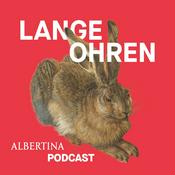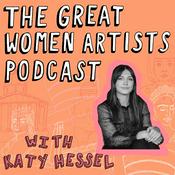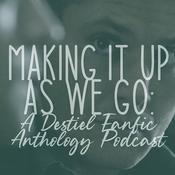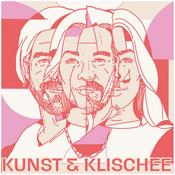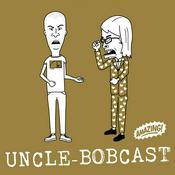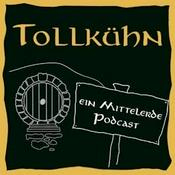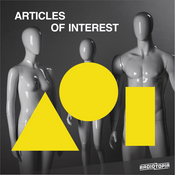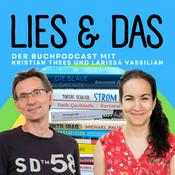91 Episoden
- In this podcast, Alice interviews Dr Erika Weiberg, Assistant Professor of Classical Studies and Theater Studies at Duke University.
Erika has recently published a book called Demanding Witness: Women and the Trauma of Homecoming in Greek Tragedy, which investigates how the trauma of female characters is represented and received in four ancient Greek tragedies about war's aftermath. To quote Erika’s own summary of the book: ‘it argues that tragic representations of female noncombatants’ trauma after war expose the ripple effects of violence that wars create, even for individuals and communities distant from the fighting. Yet female characters’ trauma is also difficult to recognize and address because doing so challenges social hierarchies and ingrained power structures. As a result, these characters’ testimonies bring about a conflict of witnessing for other characters and the audience.’
Erika’s research into the structural and chronic violence done to women who have survived war through the marginalisation of their wartime experiences – and into the efforts some of them go to, to bear witness and have others also witness their trauma – offers important insight into habits of visualising war and their intersection with wider social structures and hierarchies.
The podcast starts with a discussion of the 'trauma hero narrative', which tends to focus attention on men’s (and especially soldiers') wartime experiences and their post-conflict journeys. As Erika argues, it is not simply the case that women’s experiences of wartime trauma are given less visibility and narrative attention than men’s, but also that women’s suffering in Greek tragedy is often staged to expose male concerns – male agency, male inner conflict, male suffering, even. For this reason, we often see women in Greek tragedy having to go to some lengths to 'demand witness' to their own experiences.
As well as demanding witness to war's most obvious kinds of impacts, the women we encounter in Greek tragedy also experience more 'ambiguous' kinds of trauma, as Erika explains. We discuss 'chronic trauma', which does not centre around or get resolved by singular events; 'insidious trauma', i.e. the gradual accumulation of trauma that can be exacerbated through power imbalances and marginalisation; and the ripple effects of 'perpetrator trauma' which can flow as a moral injury to those associated with the original perpetrator. Erika also discusses moments in Greek tragedy where we see women losing control of the trauma narratives that are told about them and 'the trauma survivor's mental and emotional estrangement from their own story.'
Erika reflects on the role that Greek tragedy can play in sharpening our awareness not only of the different kinds of traumas that women can experience in and through war but also of our habits of picturing and narrating it. And she also discusses the role that modern trauma theory can play in helping us read ancient Greek tragedies in new ways.
We hope you find the episide interesting. For a version of our podcast with close captions, please use this link. For more information about individuals and their projects, please visit the University of St Andrews' Visualising War website and the Ancient Peace Studies Network.
Music composed by Jonathan Young
Sound mixing by Zofia Guertin - This episode dives deep into ancient peace history, as Alice interviews Professor Polly Low, from Durham University, and Dr Hannah Cornwell, from the University of Birmingham.
Polly is a historian of ancient Greece, with a particular interest in political history and interstate relations. Her 2007 book on Interstate Relations in Classical Greece examined the norms and ethics that shaped relations between Greek city states, the scope and enforcement of ‘international law’, and the complexities of diplomacy across the Classical period. An expert on Greek inscriptions, she has published on many other aspects of Greek political history – including imperialism, political mechanisms for restoring or ensuring stability, discourses of victory and defeat, and the commemoration of the war dead in the 5th and 4th centuries BCE.
Hannah’s research focuses on Roman socio-political history, and she is particularly interested in Roman imperialism, discourses of power, ideas of peace and approaches to diplomacy. Her 2017 book Pax and the Politics of Peace examined the two generations that spanned the collapse of the Republic and the Augustan period in order to understand how the concept of pax Romana evolved, as a central ideology of Roman imperialism. She has also published multiple articles and chapters on the representation of Roman peace-makers in literary accounts, on negotiation and diplomacy during the Roman civil wars, physical sites of diplomatic practice, and the performance and theatre of diplomacy – among other topics.
In this episode, we explore Greek and Roman understandings of peace and approaches to peacemaking. Polly and Hannah discuss the sources available to us, whose experiences of peace they particularly foreground, and what they can tell us about how ideas of peace evolved across antiquity. We consider the relationship between peacemaking and imperialism, habits of truce-making, the intricacies of diplomacy, and peace as a performance. The episode covers several hundred years of history, considering civil war contexts as well as interstate relations, and differences between democratic Athens and Rome under the Principate. We hope you enjoy the conversation. It's a long one, because of the ground we cover, so we'd suggest you listen in two halves!
For a version of our podcast with close captions, please use this link. For more information about individuals and their projects, please visit the University of St Andrews' Visualising War website and the Ancient Peace Studies Network.
Music composed by Jonathan Young
Sound mixing by Zofia Guertin - In this episode, Alice interviews Lauren Benton, Professor of History and Law at Yale University. Prof Benton specialises in global legal history and the history of European empires. She has a raft of publications to her name, on the intersection between the British empire and the origins of international law, on piracy and protectionism, and on slavery and colonisation, among other topics.
Her work in this space has involved researching many forms of violence that fall short of full-blown war, and this has culminated in her most recent book, published in 2024 by Princeton University Press, titled They Called it Peace: Worlds of Imperial Violence. Covering 500 years of history, from 1400-1900, it shines a spotlight on the many forms of violence (from raiding and enslaving to small wars and sudden massacres, all hallmarks of European imperialism) that regularly took place during times of so-called peace – calling into question how we categorise and define both peace and war.
In the podcast we dig into the book's findings, as Lauren outlines her interest in writing a different kind of global history which incorporates different cultures and perspectives and which looks beyond 'great battles' and the classic war stories we are all used to reading.
She helps us grapple with the whole spectrum of what she calls 'violence at the threshold of war and peace', noting that so-called 'small' wars have never had small impacts on the people involved. We discuss truces and their potential to drive, not just end, conflict; and Lauren outlines the violence inherent in many peace-keeping responses and 'protection emergencies', which securitise, other and control people, especially in the context of imperial power.
Lauren draws attention to the role that domestic households have long played in the 'constant drumbeat' of recurring violence that accompanies imperialism, and also to the intersection of 'regimes of armed peace' and racism. We discuss ancient and modern examples, reflecting on how blurred the boundary between war and peace often is. And we discuss what is at stake in exactly how we categorise and name different forms of violence, as e.g. full-blown war, insurgency, a 'special operation', or peacekeeping.
Lauren underlines the extent to which we continue to anticipate and accept ‘small wars’ as ‘a structural, even expected, condition of interpolity relations’; and she notes the tragic irony of our assumption that it is only by conducting this kind of supposedly ‘protective’ violence that we might achieve future peace.
We hope you enjoy this fascinating conversation about recurring patterns of conflict that history often overlooks. For a version of our podcast with close captions, please use this link. For more information about individuals and their projects, please visit the University of St Andrews' Visualising War website and the Visualising Peace Project.
Music composed by Jonathan Young
Sound mixing by Zofia Guertin - In this episode, Alice interviews Dr Beryl Pong, an expert on 20th-century and contemporary war. Beryl is a UKRI Future Leaders Fellow at the University of Cambridge’s Centre for the Future of Intelligence. An affiliated lecturer in the Faculty of English, her research is very interdisciplinary, combining literary and historical studies with visual politics and an interest in emerging technologies. Her first book, British Literature and Culture in Second World Wartime: for the Duration (published in 2020 by Oxford University Press) brings together her research on wartime literature, film and art and looks specifically at how people articulated and navigated temporal anxieties in the context of WWII. Beryl's interest in space and time, and in literary, sound and visual cultures, is also key to her current research on drone warfare. In 2024 she co-edited a book on Drone Aesthetics: War, Culture, Ecology; and she leads the Centre for Drones and Culture at Cambridge, which explores how drones are impacting the way we see and relate to our world.
The episode starts by diving into some WWII literature to explore the concept of chronophobia: a dread of both past and future, coloured by the in-between-ness of a long period of conflict that followed on from the First World War and led into the Cold War. As Beryl explains, anxieties about past and future are common to many wartime experiences, but they take on some specific resonances during WWII. Along the way, we also explore 'micro temporalities' during wartime, such as the anxiety that builds during a day about what night-time air raids might bring.
We move from discussing 20th-century 'war in the skies' to discussion of the impact that drone technologies are having on how we visualise war itself, as well as how people in conflict zones get viewed. As Beryl underlines, drones promote habits of viewing that are often top-down, imperial and securitising, with a host of real-world consequences for different people on the ground. We discuss the importance of countering this with more bottom-up ways of looking at contemporary wartime experiences, and this leads to some conversation about the roles that art can play in showing us war from new perspectives. This podcast connects to conversations in previous episodes with Julian Wright, Kathryn Brimblecombe-Fox and Paul Lushenko and Jerilyn Packer. We hope you enjoy the discussion.
For a version of our podcast with close captions, please use this link. For more information about individuals and their projects, please visit the University of St Andrews' Visualising War website and the Visualising Peace Project.
Music composed by Jonathan Young
Sound mixing by Zofia Guertin - In this episode of the Visualising War and Peace podcast, guest-host Zofia Guertin speaks with Prof. Alice König about her work expanding the Visualising War project to include peace studies. In this conversation, Alice unveils the groundbreaking Ancient Peace Studies Network—the first of its kind dedicated to examining how peace was understood, experienced, and represented across different ancient cultures.
Discover why peace narratives have received far less scholarly attention than war stories, and how Prof. König's team is working to change that by investigating whose voices and experiences are reflected in ancient accounts of peace and reconciliation.
What can ancient approaches to conflict resolution teach us about modern peacebuilding? In this thought-provoking special episode, we explore how elite-centered peace narratives shaped societal attitudes in antiquity and continue to influence our understanding of peace today. Prof. König reveals how her interdisciplinary network is "reading against the grain" of ancient sources to uncover ordinary people's lived experiences of peace—voices that have been historically marginalized but might offer valuable insights for contemporary peace literacy.
Don't miss our conversation about bridging academic research with creative outreach, as Prof. König shares details about the network's collaboration with a professional theater company, NMT Automatics, and the upcoming multi-authored publication, "New Visions of Ancient Peace." This episode offers a perfect blend of historical scholarship and practical application, demonstrating how ancient wisdom might help us visualize and build more effective paths to peace in our modern world.
We hope you enjoy the episode.
For a version of our podcast with close captions, please use this link. For more information about individuals and their projects, please visit the University of St Andrews' Visualising War website and the Visualising Peace Project.
Music composed by Jonathan Young
Sound mixing by Zofia Guertin
Weitere Kunst Podcasts
Trending Kunst Podcasts
Über Visualising War and Peace
How do war stories work? And what do they do to us? Join University of St Andrews historian Alice König and colleagues as they explore how war and peace get presented in art, text, film and music. With the help of expert guests, they unpick conflict stories from all sorts of different periods and places. And they ask how the tales we tell and the pictures we paint of peace and war influence us as individuals and shape the societies we live in.
Podcast-WebsiteHöre Visualising War and Peace, Lesen ist... - Der Morawa-Podcast und viele andere Podcasts aus aller Welt mit der radio.at-App
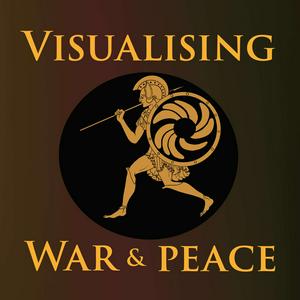
Hol dir die kostenlose radio.at App
- Sender und Podcasts favorisieren
- Streamen via Wifi oder Bluetooth
- Unterstützt Carplay & Android Auto
- viele weitere App Funktionen
Hol dir die kostenlose radio.at App
- Sender und Podcasts favorisieren
- Streamen via Wifi oder Bluetooth
- Unterstützt Carplay & Android Auto
- viele weitere App Funktionen


Visualising War and Peace
Code scannen,
App laden,
loshören.
App laden,
loshören.








